A concussion is a brain injury that can cause brain damage or disability—Temporary or Permanent changes in the way the brain works.
Signs and symptoms of concussions
- Loss of consciousness
- Severe headache
- Blurred vision
- Trouble walking
- Confusion
- Saying things that do not make sense
- Slurred speech
- Unresponsiveness (You cannot wake the person)
- Some symptoms may only show up 24 to 72 hours after the injury
- If you think someone has a concussion , go to your community health centre or contact emergency services right away.
Ways to Reduce the chance of Concussions
- When playing sports, wear the recommended equipment and follow the instructions.
- Helmets are recommended for these activities:
- Playing high impact sports, such as hockey
- Driving or riding a snowmobile or ATV
- Riding a bicycle
- In a car or truck, it is safest for everyone to wear a seatbelt.
- Watch young children around places they could fall, such as the playground.
- If young children live with you or visit: Consider placing a gate at the top and bottom of the stairs, if your home has them.
- Cyclists can wear reflective clothing and arm bands or add blinkers/lights to their bike so they can be seen better in the dark.
Helmet Safety Tips
Helmets can reduce the risk of a serious head injury by 80%!
It is recommended that children and adults wear properly fitted and secure helmets. whether riding a bicycle, ATV, or snowmobile.
To make sure a helmet fits right, use the 2V1 rule.
- The helmet sits 2 fingers abover your eyebrows
- The straps forma V under your ears
- 1 finger can fit between the strap and chin



